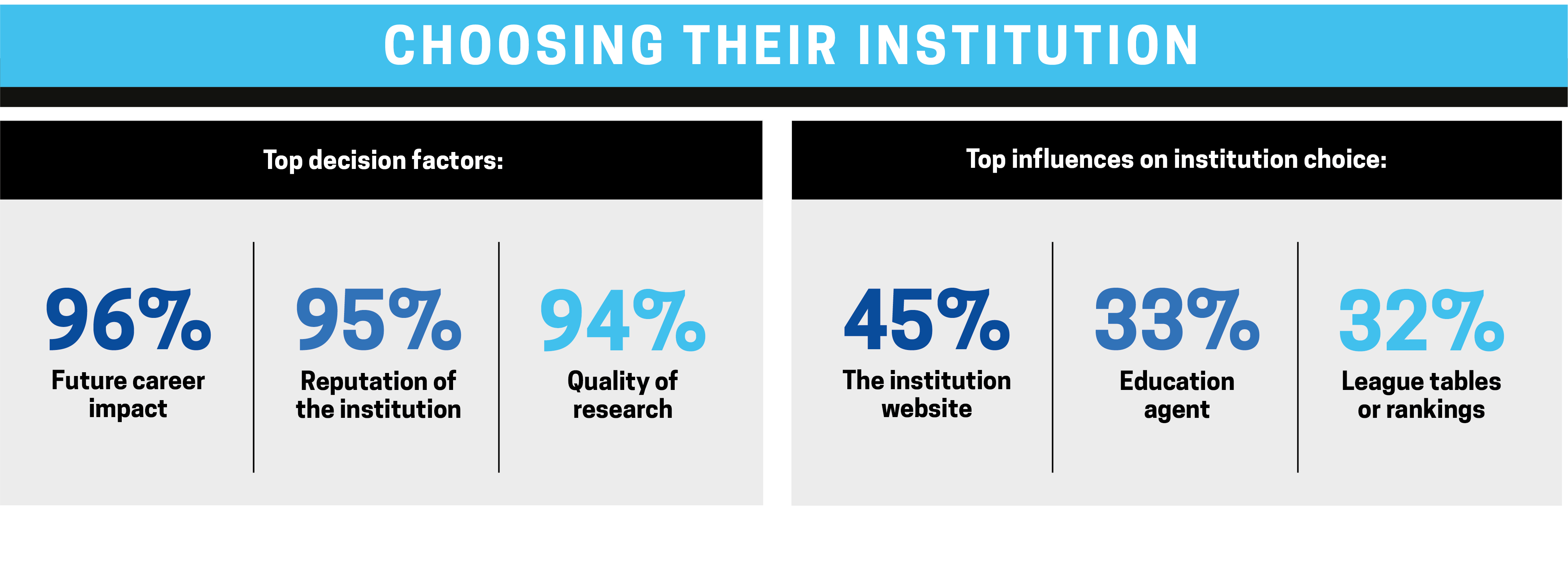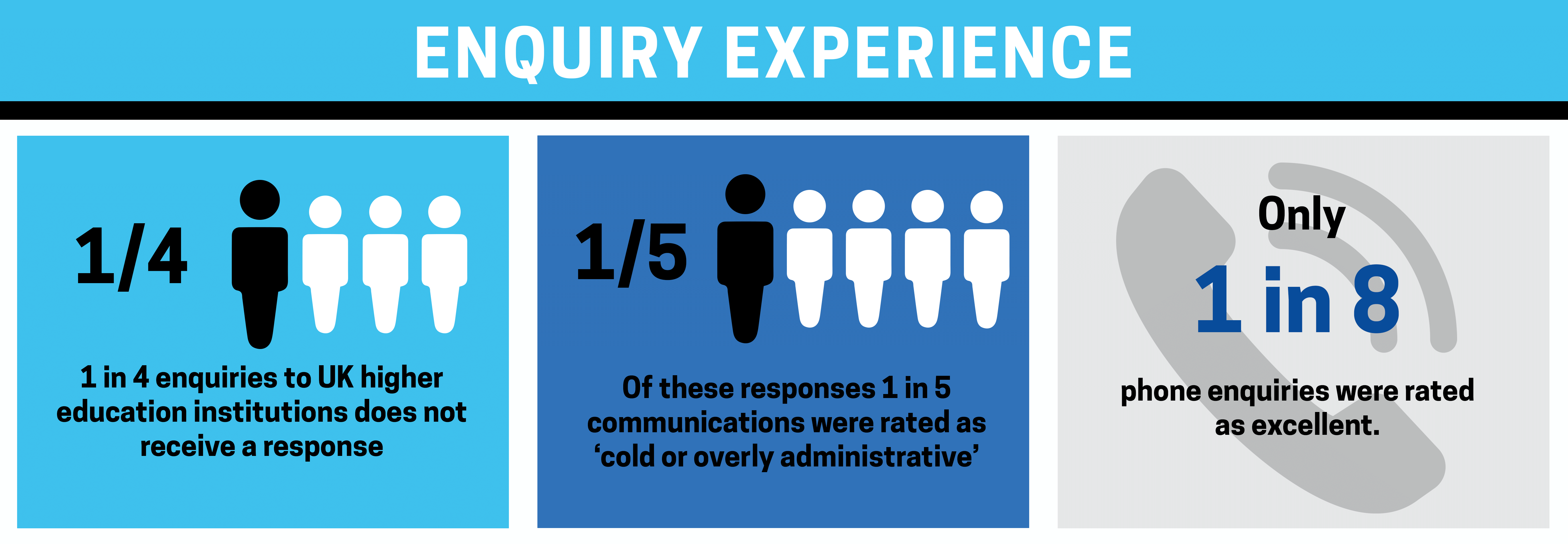Key ways to differentiate your campaigns to attract international students to the UK.
Recruiting international students was challenging prior to the global pandemic, but since the outbreak of Covid-19, marketing teams in UK higher education institutions have to be even smarter in the way they develop campaigns for prospective students. With a global focus on attracting international students, listening to the student voice, and reflecting it in finely tuned, hyper-relevant marketing and recruitment programs, has never been more important.
In the first of our series on this subject, we summarise the key takeaways from the recently published, must-read International Student Barometer whitepaper for marketing and recruitment departments that want to target international students. With a deep dive into the UK Government priority groups and what messages they care about most.
Overall, the top considerations for international students from across the world for specifically choosing to study in the UK are future career impact, reputation of the institution, and quality of the learning and research on offer - with the university’s website, education agent and league tables or rankings influencing their final decision.

But it’s also worth reflecting on the fact that based on 4 year’s worth of data and over 20 million data points, international student happiness has dropped 11% since Covid restrictions were introduced in the UK, which is down 7% on the global average. Having participated in the ISB since 2005, Deputy Director International at Durham University, Fiona O’Carroll explains why tailoring messages to recent feedback from international students is vital for 2022 campaigns:
“Gathering the views of international students has never been more important, considering how the pandemic has forced us to rethink how we deliver education and the wider student experience.”
Fiona O’Carroll, Deputy Director International, Durham Univeristy
For example, students revealed that online experience is a significant factor in the drop in happiness and satisfaction levels, the whitepaper summarises: “International students who participated in an online/virtual onboarding programme were notably less likely to be satisfied with it than their counterparts who attended a face-to-face orientation.” (Page 14)

So paying close attention to the blended and online international experience from before the point of enquiry, through communications and beyond enrolment, is key to converting prospects into admissions. Whilst this might sound an obvious point to make, some shocking statistics from a recent mystery shopping research project from UniQuest into ‘Enquiry Experience’ revealed that 1 in 4 enquiries to UK higher education institutions does not receive a response and of the responses, 1 in 5 communications were rated as ‘cold or overly administrative’. Furthermore, only 1 in 8 phone enquiries were rated as excellent. It’s therefore worth testing and reviewing marketing and recruitment processes to ensure that no prospective student’s communications are overlooked, and are appropriately nurturing. A CRM system built specifically for higher education can play an important role in nurturing students and automating communications to ensure all enquiries receive a response. And as students respond well to word of mouth and peer recommendations, student testimonials about positive online applications, enrolment and admissions experiences the university has facilitated might help to put prospective students at ease.
Top consideration: Future career impact and employability
Students are increasingly making career focussed study decisions. In 2014, ‘institution reputation’ was the number one reason amongst international students according to 93% of respondents; since 2018 however, ‘future career impact’ has been number one for both undergraduates and postgraduates. Interestingly, Tribal’s Financial benchmarking data indicates “UK Higher Education Institutions spend, on average, 9 times more on marketing to students than on the future careers of their students”. So developing marketing campaigns that share the positive impact the institution and study will have on an international student’s future career will help to differentiate your university from the competition. And be sure to include the earning potential of specific course titles as well as the reputation of the institution (and the UK in general) in your campaigns. As student happiness is influenced by how prepared students feel for their next step after graduation, focusing case studies on employability and next steps is also likely to turn graduates into brand ambassador alumni. For postgraduates, unsurprisingly, the quality of the research is also something they need to be sure about from your communications.
But how can you further tailor your campaigns to students from the priority groups?
Top considerations for priority international student groups
In line with the Governments ambition to increase “the number of international students studying in the UK to 600,000 per year” they have set out priority countries and regions. Here are our highlights for the priority groups, which have been drawn by analysing the ISB data that correlates to the question “Overall how happy are you with your life at University at this stage in the year”:
China
Learning, living and support are at the top of the list for students from China choosing to study internationally, with the host country’s culture being key to their decision-making. Campaigns that also focus on the range of social activities they can engage in, any faith provisions you offer, and the opportunities to host their friends will help to attract these students. Showcasing the wealth of UK culture, and how easy it is to travel to and enjoy using your university as a base, will also help with this student group’s shortlisting.
India
Students from across India who are looking to study internationally need to know they can make good contacts for their future, whilst making friends with a diverse range of people through the social activities your university has on offer. So sharing information about the range of ways international students can engage with their peers, outside of their academic studies, alongside details of the specific extra-curricular activities available at the university will help target messaging to students from India.
Hong Kong SAR
The quality of graduate school, opportunities to manage research, and teach are of the upmost importance to students from Hong Kong SAR when shortlisting their potential international universities. Case studies that share how other Hong Kong SAR students have taught through their graduate programmes will be of real interest to this student group.
Vietnam
For students from Vietnam, transportation is key and features twice in their top considerations – both between university locations and links to other places in the host country. So campaigns that feature the ease of travel will certainly help attract this student group. Living satisfaction is also important, so focussing on the residences you have to offer, as well as the support options available will be key to the success of the campaigns. Sharing positive information from the university’s Student Advisory and Student Union will also help to influence their decision.
Nigeria
The data set from students from Nigeria was less consistent than other groups, perhaps making this group more difficult to target with marketing campaigns, but overall support, learning and living influenced international students’ happiness with their host university. Interestingly, the cost of housing is now more of an important consideration than in the 2017 ISB. So on balance, campaigns that focus on the support available to international students – both from a living and a learning perspective - are likely to resonate more.
Germany
Campus safety has long been a deciding factor for students from Germany when considering where to study internationally. The campus surrounding, size of classes, access to personal tutors, and opportunity to study with people from other cultures also influence their choice of university. So campaigns that focus messaging around these considerations, as well as lots of information about specific academic content of the courses on offer to them are more likely to attract students from Germany.
Key Take-aways from the spotlight on priority student groups
Sharing case studies from happy students who are eager to recommend your institute for a welcoming arrival, high-quality courses and learning provision, and excellent standards of living in safe, secure and diverse student communities will have appeal to all priority nationalities. The following four elements are also consistent across these groups, making them cornerstone content for your campaigns:
- Making good contacts for the future - including employability and career opportunities
- Opportunities to experience the host culture – including ease of travel
- Social activities – and insight into the sense of community amongst diverse groups of students
- Social facilities and faith provision – to help showcase that you offer a home, away from home.
The other great news to shout about? Students are continuing to look to study abroad – and they are looking at countries with a high vaccine rate. So mentioning the UK’s positive vaccination story could also be another highlight of your 2022 campaigns.
To make sure your 2022 international student nurture campaigns are optimised for engagement, download our free guide full of top tips to make the most of your CRM solution.




